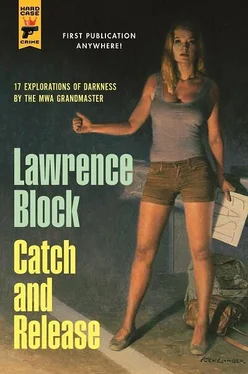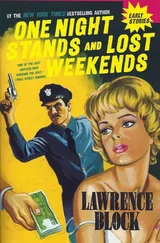“With nylons?”
“And cigarettes and chocolate. And other things, if you can get them.”
“What other things?”
“Anything. Soap, even.”
And so he began trading, with Helga as his partner in and out of bed. She was the daughter of shopkeepers and turned out to be a natural at her new career, knowing instinctively what to buy and what to sell and how to set prices. He was just a farm boy, but he had a farm boy’s shrewdness plus the quickness it had taken to survive combat as a foot soldier, and he learned the game in a hurry. As with any extralegal trade, there was always a danger that the person you were dealing with would pull a fast one — or a gun or a knife — and use force or guile to take everything. Gary knew how to make sure that didn’t happen.
It was another American soldier who got Gary into the art business. The man was an officer, a captain, but the black market was a great leveler, and the two men had done business together. The captain had a fraulein of his own, and the two couples were drinking together one evening when the captain mentioned that he’d taken something in trade and didn’t know what the hell he was going to do with it. “It’s a painting,” he said. “Ugly little thing. Hang on a minute, I’ll show you.” He went upstairs and returned with a framed canvas nine inches by twelve inches, showing Salome with the head of John the Baptist. “I know it’s from the Bible and all,” the captain said, “but it’s still fucking unpleasant, and if Salome was really that fat I can’t see losing your head over her. This look like five hundred dollars to you, Gary?”
“Is that what you gave for it?”
“Yes and no. I was going back and forth with this droopy-eyed Kraut and we reached a point where we’re five hundred dollars apart. And he whips out this thing of beauty. ‘All right,’ he said. ‘I vill hate myself for doing zis, but you haff me over a bushel.’ And he goes on to tell me how it’s a genuine Von Schtupp or whatever the hell it is, and it’s worth a fortune.
“The way he did it, I couldn’t come back and say, look, Konrad, keep the picture and gimme a hundred dollars more. I do that and I’m slapping him in the face, and I don’t want to rub him the wrong way because Konrad and I do a lot of business. And the fact of the matter is yes, we’re five hundred bucks apart, but I could take the deal at his price and I’m still okay with it. So I said yes, it sure is a beautiful picture, which it’s not, as anyone can plainly see, and I said I’m sure it was valuable, but what am I gonna do with it? Sell it in Paris, he says. Sell it in London, in New York. So I let him talk me into it, because I wanted the deal to go through but what I didn’t want was for him to try palming off more of these beauties on me, because I saw the look in his eye, Gary, and I’ve got a feeling he’s got a shitload of them just waiting for a sucker with a suitcase full of dollars to take them off his hands.”
“What are you going to do with it?”
“Well, I don’t guess I’ll throw darts at it. I could take it home, but what’s a better souvenir, a genuine Luger or an ugly picture? And which would you rather spend your old age looking at?”
Gary looked at the painting, and he looked at Helga. He saw something in her eyes, and he also saw something in the canvas. “It’s not that ugly,” he said. “What do you want for it?”
“You serious?”
“Serious enough to ask, anyway.”
“Well, let’s see. I’ve got five hundred in it, and—”
“You’ve got zero in it. You’d have done the deal for what he offered, without the painting.”
“I said that, didn’t I? Strategic error, corporal. I’ll tell you what, give me a hundred dollars and it’s yours.”
“Let’s split the difference,” Gary said. “I’ll give you fifty.”
“What is it we’re splitting? Oh, hell, I don’t want to look at it anymore. Give me the fifty and you can hang it over your bed.”
They didn’t hang it over the bed. Instead Helga hid it under the mattress. “The Nazis looted everything,” she told him. “Museums, private collections. Your friend is stupid. It’s a beautiful painting, and we can make money on it. And if we can meet his friend Konrad—”
“There’s more where this one came from,” he finished. “But how do we sell them?”
“You can get to Switzerland, no?”
“Maybe,” he said.
The painting, which he sold without ever learning the artist’s name — he somehow knew it was not Von Schtupp — brought him Swiss francs worth twenty-eight hundred American dollars. The proceeds bought four paintings from the droopy-eyed Konrad. These were larger canvases, and Gary removed them from their frames and rolled them up and took them to Zurich, returning to Germany this time with almost $7000. And so it went. It wasn’t a foolproof business, as he learned when his Zurich customer dismissed a painting as worthless kitsch. But it was a forgiving trade, and most transactions were quite profitable. If he was in doubt he could take goods on consignment, selling in Zurich or Geneva — or, once, in Madrid — and sharing the proceeds with the consignor. But you made more money if you owned what you were selling, and he liked owning it, liked the way it felt. And if there was more risk that way, well, he liked the risk, too.
All his time and energy went into the business. Art was all he bothered with now — there were enough other soldiers making deals in stockings and cigarettes — and he was preoccupied with it, with the buying and selling and, almost as an afterthought, with the paintings themselves. Because it turned out he had a feel for it. He’d seen something in that first painting of Salome, even if he hadn’t realized it at the time. He’d responded to the artistry. Before he enlisted, he’d never been to a museum, never seen a painting hanging in a private home, never looked at any art beyond the reproductions in his mother’s J.C. Penney calendar. He learned to look at the paintings, as he’d never looked at anything before. The more he liked a painting, the harder it was to part with it. He fell in love with a Goya, and held onto it until something else came along that he liked better. Then he sold the Goya — that was the one he took to Madrid, where he’d heard about a crony of Franco’s who wouldn’t be put off by the work’s dodgy provenance.
It was easier to part with Helga. They’d been good for each other, as lovers and as business partners, but the affair ran its course, and he didn’t need or want a partner in his art dealings. He gave her a fair share of their capital and went on by himself.
Nothing lasts forever, not even military service. There came a time for Gary to board a troopship headed back to the States. He thought of staying in Europe — he had a career here, for as long as it could last — but in the end he realized it was time to go home. But what to do with his money? He had run his original stake of cigarettes and nylons up to something like eighty thousand dollars. That was a lot of cash to carry, and it was cash he couldn’t explain, so he had to carry it — he couldn’t put it in a bank and write himself a check.
But what he could do, and in fact did, was buy a painting and bring that home with him. He chose a Vermeer, a luminous domestic interior, the most beautiful thing he’d ever seen in his life. It hadn’t come to him in the usual way; instead, he’d found it in an art gallery in Paris and had been hard pressed to get the snooty owner to cut the price by ten percent. On the troopship, squinting at the painting in his footlocker by what little illumination his flashlight afforded, he decided he must have been out of his mind. He’d had all that cash, and now he was down to what, fifteen thousand dollars? That was a lot of money in 1946, it would buy him a house and get him started in a business, but it was a fifth of what he’d had. Well, maybe he could run it up a little. It would be a week before the ship docked in New York, and there were plenty of men on board with money in their pockets and time on their hands. There were card games and crap games running twenty-four hours a day, and he’d always been pretty good at a poker table.
Читать дальше








